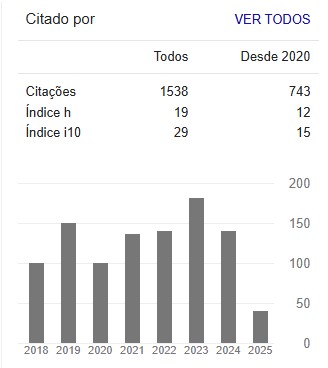Saneamento Básico e o Sistema de Castas na Índia. Um tributo a B.R Ambedkar
DOI:
https://doi.org/10.47456/geo.v2i35.39235Palavras-chave:
Índia, castas, saneamento básicoResumo
É um fato particular da sociedade indiana a limpeza de latrinas e fossas sépticas de forma manual. Seus praticantes, conhecidos por manual scavengers, pertencem em sua maioria à casta mais vulnerável da sociedade, os dalits. O artigo busca relacionar a relevância do legado das lutas anticastas fomentadas por B.R Ambedkar e o sistema de castas nas práticas de saneamento básico na Índia. Ambedkar travou um debate caloroso com Gandhi sobre o tema, e ambos apresentaram soluções distintas para a questão sanitária. Nos anos 2000, o combate às práticas de defecação ao ar livre se tornou parte central dos programas sociais indianos. Em 2014, o governo federal lançou a Missão Índia Limpa, programa social com o objetivo de universalizar o acesso a banheiros no país. Neste contexto, o artigo seguirá para uma análise da relação entre o sistema de castas e as práticas sanitárias atuais.
Downloads
Referências
AMBEDKAR, Bh Ramji. Annihilation of Caste. New Delhi: Verso, [1936] 2014.
AMBEDKAR, Bhimrao Ramji. Babasaheb Ambedkar: writings and speeches. New Delhi: Dr Ambedkar Foudation, vol. 09, 2019.
AMBEDKAR, Bhimrao Ramji. The Untouchables. Who were them and why They became untouchables? Chennai: MJP Plubishers, 2018.
DORON, Assa; JEFFREY, Robin. Waste of a Nation: Garbage and Growth in India. Harvard University Press 2014.
EXUM Natalie; GORIN, Emma; SADHU, Goutam et al. Evaluating the declarations of open defecation free status under the Swachh Bharat (‘Clean India’) Mission: repeated crosssectional surveys in Rajasthan, India. BMJ Global Health 2020
GANDHI, Mohandas Karamchand. Hindi Swaraj or Indian Home Rule. Ahmedabad: Navajivan Publishing House [1909] 1938.
GANDHI, Mohandas Karamchand. The Collected Works of Mahatma Gandhi. New Delhi: Government of India, vol. 04, 1960.
GANDHI, Mohandas Karamchand. The Collected Works of Mahatma Gandhi. New Delhi: Government of India, vol. 19, 1966.
GANDHI, Mohandas Karamchand. The Collected Works of Mahatma Gandhi. New Delhi: Government of India, vol. 20, 1966b.
GANDHI, Mohandas Karamchand. The Collected Works of Mahatma Gandhi. New Delhi: Government of India, vol. 42, 1970.
GANDHI, Mohandas Karamchand. The Collected Works of Mahatma Gandhi. New Delhi: Government of India, vol. 61, 1975.
GANDHI, Mohandas Karamchand. The Collected Works of Mahatma Gandhi. New Delhi: Government of India, vol. 64, 1976.
GANDHI, Mohandas Karamchand. The Collected Works of Mahatma Gandhi. New Delhi: Government of India, vol. 85, 1982.
GANDHI, Mohandas Karamchand. The Collected Works of Mahatma Gandhi. New Delhi: Government of India, vol. 77, 1979a.
GATADE, Subhash. Silencing Caste, Sanitising Oppression: Understandig Swatchh Bharat Abhiyan. Economic and Political Weekly, vol 50, n 44, 2015.
MASUKI, Yui. Ideas and Practices for Restoring the Humanity of Sanitation Workers in India. In: YAMAUCHI, Taro; NAKAO, Seiji; HARADA, Hidenori (eds). The Sanitation Triangle. Socio-Culture, Health, and Materials. Kyoto University Press: Springer, pp. 21-46, 2022.
OLWE, Sudharak. In Search of Dignity and Justice. The Untold Story of Conservancy Workers Mumbai: Spenta Multimedia, 2013.
PATHAK, Bindeshwar. Road to Freedom. New Delhi: Xetreme Office, 2006.
PRASAD, Srirupa. Cultural politics of hygiene in India, 1890-1940. New York: Palgrave Macmillian, 2015.
RAMASWAMY, Gita. India Stinking: Manual Scavengers in Andhra Pradesh and Their Work. New Delhi: Navdanya, 2005.
SHYAM, Lal Ambedkar and the Bhangis. Jaipur: Rawat Publications, 2018
SINGH, Aakash. Gandhi and Ambedkar: Irreconcilable Differences? In: International Journal of Hindu Studies, Springer, vol 18, n.03, 2014.
SINGH, Bhasha. Unseen. Gurgaon: Penguin, 2014.
SUZUKI, Maya. Caste and Untouchables in Contemporary India. Tokyo: Keio University Press, 2015.
ZELLIOT, Eleanor. From Untouchable to Dalit. New Delhi: Manohar, 2001.
Downloads
Publicado
Edição
Seção
Licença
Autores que publicam nesta revista concordam com os seguintes termos:- Autores mantém os direitos autorais e concedem à revista o direito de primeira publicação, com o trabalho simultaneamente licenciado sob a Licença Creative Commons Attribution que permite o compartilhamento do trabalho com reconhecimento da autoria e publicação inicial nesta revista.
- Autores têm autorização para assumir contratos adicionais separadamente, para distribuição não-exclusiva da versão do trabalho publicada nesta revista (ex.: publicar em repositório institucional ou como capítulo de livro), com reconhecimento de autoria e publicação inicial nesta revista.
- Autores têm permissão e são estimulados a publicar e distribuir seu trabalho online (ex.: em repositórios institucionais ou na sua página pessoal) (Veja O Efeito do Acesso Livre).




























